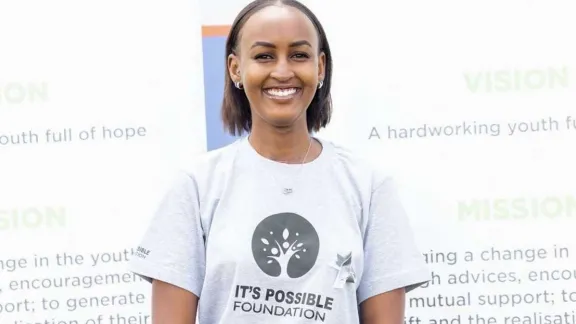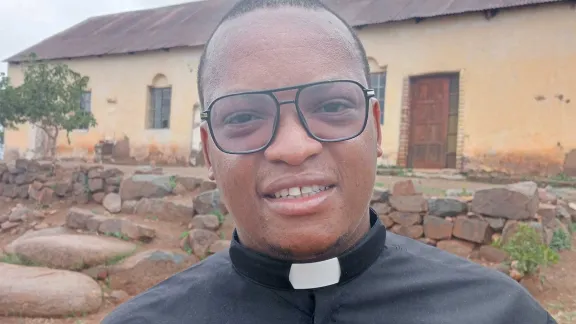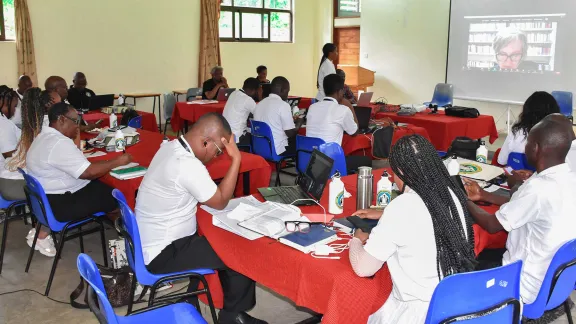Two participants in the LWF training program on theology, leadership, and gender justice share how newly acquired skills and knowledge advance their work in the church and community.

LWF Council member Ms Phiona Uwase, Lutheran Church of Rwanda, is a volunteer at the It’s Possible Foundation in Kigali. She is one of the 37 people who have completed the LWF training on theology, gender justice, and leadership education. Photo: Private
LWF program promotes “healthy and inclusive notions of gender” and “progressive leadership”
(LWI) – Ms Phiona Uwase, a youth leader in the Lutheran Church of Rwanda (LCR) says her work at the It’s Possible Foundation has gained a new dimension: creating a more equitable society where individuals are not confined by rigid gender roles and expectations.
In February 2024, she graduated with a certificate in Theology, Gender Justice and Leadership Education (TGLE) following two residential training sessions at the Tumaini University Makumira (TUMA) in Arusha, Tanzania, and one-year research in her home county. The Lutheran World Federation (LWF) established the program in 2022 in collaboration with the university and the Evangelical Lutheran Church in Tanzania. Participants are drawn mostly from LWF member churches in Africa, and the second cohort to which Uwase belonged, had 20 students from 10 countries.
Uwase’s research focused on educating women and men to nurture positive masculinity and femininity that promote gender justice in LCR. “The reason behind my research was to challenge harmful gender stereotypes and promote healthy and inclusive notions of gender,” said the 24-year-old, a member of the LWF Council.
The reason behind my research was to challenge harmful gender stereotypes and promote healthy and inclusive notions of gender
Ms Phiona Uwase, Lutheran Church of Rwanda
The LWF TGLE program has “deepened my understanding of theology, leadership, and more about gender justice, and equipped me with valuable knowledge and skills that I can apply in my ministry and daily life,” Uwase added. “It has brought new perspectives, insights, and practices that will enrich our worship services and also empower leaders within the church to take on new roles and responsibilities, leading to a more vibrant and dynamic community,” she added.
She is putting her new skills to use at the non-profit organization, with the objective of helping young people to achieve their dreams and contribute to nation building. “We often visit schools and have dialogue with students on different topics that concern young people, and share our experiences with them to help them grow with a positive outlook to life,” she explained.
“We are all volunteers—48 female, 28 male—who came together after finishing high school, most of us from the same school but later new members came in slowly from different places in Rwanda,” she says of the team that runs It’s Possible. In May, Uwase also graduated with a bachelor’s degree in business marketing from the University of Kigali.
Changes for a parish pastor

Rev. Kopoetsile John Legote, Evangelical Lutheran Church in Southern Africa. Photo: Private
Evangelical Lutheran Church in Southern Africa (ELCSA) pastor Rev. Kopoetsile John Legote, was also in the second cohort of the LWF program. He said the biblical approaches introduced in the training have changed how he views texts in the Bible. “It has made me more gender sensitive in how I minister to parish members and the community at large.” The presentations around leadership “were very good for me, as they highlighted the importance of good progressive leadership,” he noted.
Legote serves in ELCSA’s rural parish of Kgalatlou in the northernmost district of Ga-Sekhukhune. He has been a pastor for over three years, since graduating with a bachelor’s degree in theology from the Augustana Lutheran Theological Seminary at Umphumulo.
Legote’s research focused on the experiences of women in leadership in ELCSA, and how to develop methods to overcome gender injustice “which is active and alive” in the church. He described the findings as “interesting,” as they highlighted “the hostile environment” and “all types of abuses” to which women are subjected when they take more responsibility in the church. “I do believe that this research can be taken further, and more data can come from that,” he added.
Broader impact
To date, 37 women and men have completed the training funded through the Hélène Ralivao Fund, and another 22 in the third cohort are expected to graduate early next year. Research papers by the students will be compiled as a resource for churches and institutions in Africa and beyond.
For Legote, the program also provides an opportunity to meet new people, share experiences, and create bonds of friendship. “Some have become brothers and sisters to me,” he added.

Third cohort students of the TGLE program, during a training session at the Tumaini University Makumira in Arusha, Tanzania. Photo: ELCT/TUMA


